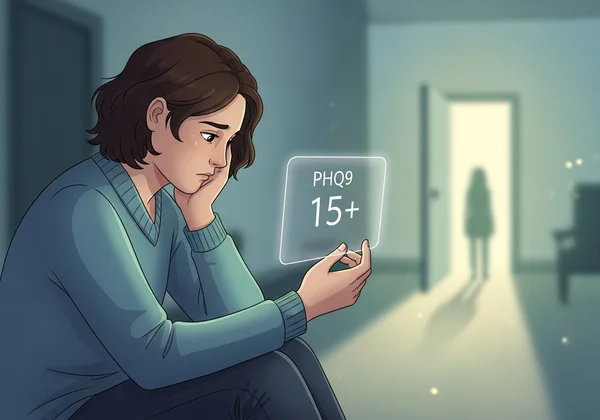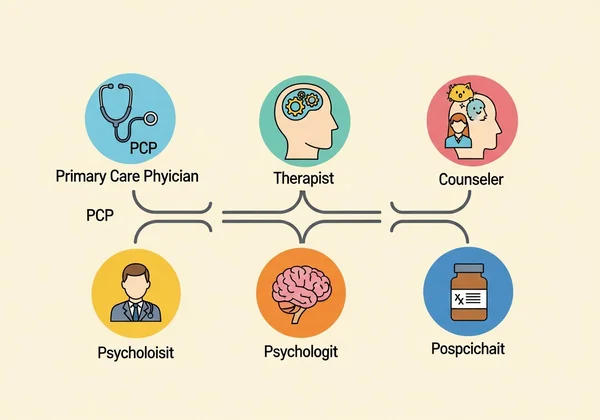High PHQ9 Score (15+)? Your Next Steps & Support Guide
November 13, 2025 | By Clara Holloway
Receiving a high phq9 score of 15 or more can feel unsettling, perhaps even overwhelming. It's a significant number that points to challenging emotional experiences. If you're seeing this score, it’s completely normal to feel a mix of concern and confusion. What does this result really mean for you? This guide is here to walk you through that question with compassion and clarity. Think of this as a gentle, supportive first step. It’s an opportunity to understand what you’re feeling and discover the paths toward support and well-being. Remember, this score is a starting point, not a final diagnosis. Your journey toward feeling better begins with understanding, and you can always revisit your emotional checkup with our free online test.
Understanding What a High PHQ9 Score Means
A score of 15 or higher on the Patient Health Questionnaire-9 (PHQ-9) places your symptoms in the "moderately severe" to "severe" depression category. It suggests that the symptoms you’ve been experiencing over the last two weeks are significantly impacting your daily life. This isn't just a feeling of being "down"; it's a persistent weight that affects your energy, concentration, sleep, and overall sense of self. Understanding this is the first step toward taking meaningful action. The score is a reflection of your current struggle, and acknowledging it is an act of courage.

Deciphering Your PHQ9 Score: Severity Levels Explained
The phq9 score ranges are designed to provide a snapshot of symptom severity. While a formal interpretation should always come from a healthcare professional, the general guidelines are as follows:
- 0-4: None-minimal depression
- 5-9: Mild depression
- 10-14: Moderate depression
- 15-19: Moderately severe depression
- 20-27: Severe depression
A score in the 15+ range indicates that your symptoms are frequent and intense. It's a strong signal that these feelings are not something to ignore or simply "push through." Instead, this is a crucial moment to pause and listen to what your emotional health is telling you. You can learn more about your score by using the tools on our PHQ9 resources.
Why the PHQ9 is a Screening Tool, Not a Diagnostic Test
It is absolutely critical to understand that the PHQ-9 is a screening tool. It is an incredibly valuable and validated method for identifying and monitoring depressive symptoms, but it cannot diagnose clinical depression on its own. A formal diagnosis requires a comprehensive evaluation by a qualified healthcare provider. They will consider your score, your personal history, life circumstances, and other medical factors to create a complete picture of your health. Think of your PHQ-9 score as a thermometer reading for your emotional health—it tells you there's a fever, but a doctor is needed to diagnose the illness and prescribe treatment.
Immediate Actions for Severe Depression Help
When your score is high, it’s important to focus on immediate safety and well-being. The weight of these feelings can be immense, and taking small, concrete steps can make a significant difference. Your priority right now is to ground yourself and ensure you are safe. These feelings, however intense, are manageable with the right support.
If You're Experiencing a Crisis: Urgent Help Resources
If your PHQ-9 results included thoughts of self-harm (question #9), or if you are feeling hopeless or in a crisis, your safety is the number one priority. Please reach out for crisis help immediately.
- Contact a crisis hotline: Search for a local crisis line or use a national resource like the 988 Suicide & Crisis Lifeline in the United States. These services are free, confidential, and available 24/7.
- Go to the nearest emergency room: If you are in immediate danger, hospital emergency departments are equipped to provide urgent mental health care.
- Call emergency services: Dial your local emergency number (like 911) if you cannot safely get to a hospital.
Reaching out in a crisis is a sign of profound strength. There are people who want to help you through this moment.

Sharing Your Feelings: Talking to a Trusted Person
While professional help is essential, the power of human connection cannot be overstated. Find a trusted friend, family member, or partner to share what you're going through. You don't need to have a perfect script. Simply saying, "I'm having a really hard time and I'm not okay," can lift a significant burden. Choose someone you know to be compassionate and non-judgmental. The goal isn't for them to solve your problems, but simply to listen and be present with you. This act of sharing can combat the intense isolation that often accompanies depression.
Your Next Steps: Connecting with Professional Support
A high PHQ-9 score is a clear call to connect with a professional. This is the most important step you can take toward long-term healing and recovery. Navigating the mental healthcare system can seem daunting, but breaking it down into manageable steps makes it much easier. You’ve already taken the first step by completing the assessment; now it’s time to use that information to get the right support.

Navigating Mental Health Professionals
There are several types of mental health professionals who can help, and understanding their roles can guide your choice:
- Primary Care Provider (PCP) / General Practitioner (GP): A great first stop. Your family doctor can conduct an initial evaluation, rule out other medical causes for your symptoms, and provide a referral to a mental health specialist.
- Therapist/Counselor (LPC, LCSW, LMFT): These professionals specialize in talk therapy (psychotherapy) and can help you develop coping strategies, process difficult emotions, and change behavioral patterns.
- Psychologist (Ph.D., Psy.D.): Psychologists are trained in psychotherapy and can also perform more in-depth psychological testing.
- Psychiatrist (MD, DO): A medical doctor who specializes in mental health. Psychiatrists can diagnose mental health conditions, provide therapy, and are licensed to prescribe medication.
Preparing for Your First Appointment: What to Expect
Feeling nervous before your first appointment is normal. To ease your anxiety, a little preparation can go a long way. Consider bringing a copy of your PHQ9 results or simply writing down your score. Be ready to talk about what you’ve been feeling, how long it's been going on, and how it’s affecting your life. There are no right or wrong answers. The goal of this first meeting is for the professional to get to know you and for you to see if they are a good fit.
Understanding Treatment Paths: Therapy, Medication & More
Treatment for depression is not one-size-fits-all. A professional will work with you to create a personalized plan. Common, evidence-based treatments include:
- Psychotherapy (Talk Therapy): Techniques like Cognitive Behavioral Therapy (CBT) and Dialectical Behavior Therapy (DBT) are highly effective.
- Medication: Antidepressant medications can be very helpful, often in combination with therapy.
- Lifestyle Changes: Your provider will also likely discuss the roles of exercise, nutrition, sleep, and social connection in your recovery.
Compassionate Self-Care When Your PHQ9 Score is High
While you navigate the path to professional support, practicing compassionate self-care is vital. This isn’t about forcing yourself to "be happy," but about taking gentle, consistent actions that support your well-being. These are supportive measures, not replacements for professional treatment.
Gentle Daily Habits for Self-Care
When your energy is low, even small actions can feel like big wins. Focus on simple, achievable goals:
-
Movement: A short 10-minute walk outside can gently boost your mood.
-
Nutrition: Try to eat something small and nourishing, even if your appetite is low.
-
Hydration: Keep a glass of water nearby and sip throughout the day.
-
Sunlight: Spend a few minutes in natural sunlight, which can help regulate your internal clock.

Managing Overwhelm: Practical Coping Strategies
When you feel overwhelmed, coping strategies can help you feel more grounded. Try the 5-4-3-2-1 grounding technique: name five things you can see, four things you can feel, three things you can hear, two things you can smell, and one thing you can taste. This simple exercise pulls you into the present moment and can quiet anxious thoughts. Deep, slow breathing is another powerful tool for calming your nervous system.
Remember: You Are Not Alone and Support is Available
A high PHQ-9 score can feel isolating, but it is so important to remember that you are not alone. Millions of people experience these feelings and have found paths to recovery. This score is not a personal failing; it is a sign of a health condition that deserves care and attention. Help is available, and things can and do get better. To better understand your feelings, you can take the assessment again when you're ready.
Frequently Asked Questions About High PHQ9 Scores
What does a PHQ9 score of 15 or higher truly indicate?
A score of 15 or higher on the patient health questionnaire 9 indicates moderately severe to severe depressive symptoms. It strongly suggests that your symptoms are significantly interfering with your ability to function in your daily life and that seeking a professional evaluation is a critical next step.
Can the PHQ9 test itself diagnose me with depression?
No, the PHQ-9 is a highly effective screening tool, but it cannot provide a medical diagnosis. A diagnosis of depression must be made by a qualified healthcare professional after a comprehensive clinical evaluation. Your score is an important piece of information to share with them.
Is the PHQ9 considered a reliable tool for assessing depression symptoms?
Yes, the PHQ-9 is one of the most widely used and scientifically validated tools for screening for and monitoring depression. It is trusted by clinicians worldwide for its reliability and accuracy in capturing the core symptoms of depression. For more information, explore our resources.
What is typically considered a "positive" score on the PHQ9 questionnaire?
A score of 10 or higher is often used as the "cut-off" for a positive screening, suggesting that significant depressive symptoms are present and a further evaluation is warranted. A score of 15+ indicates a higher level of severity that requires more immediate attention. You can always retake the test to track your symptoms over time.